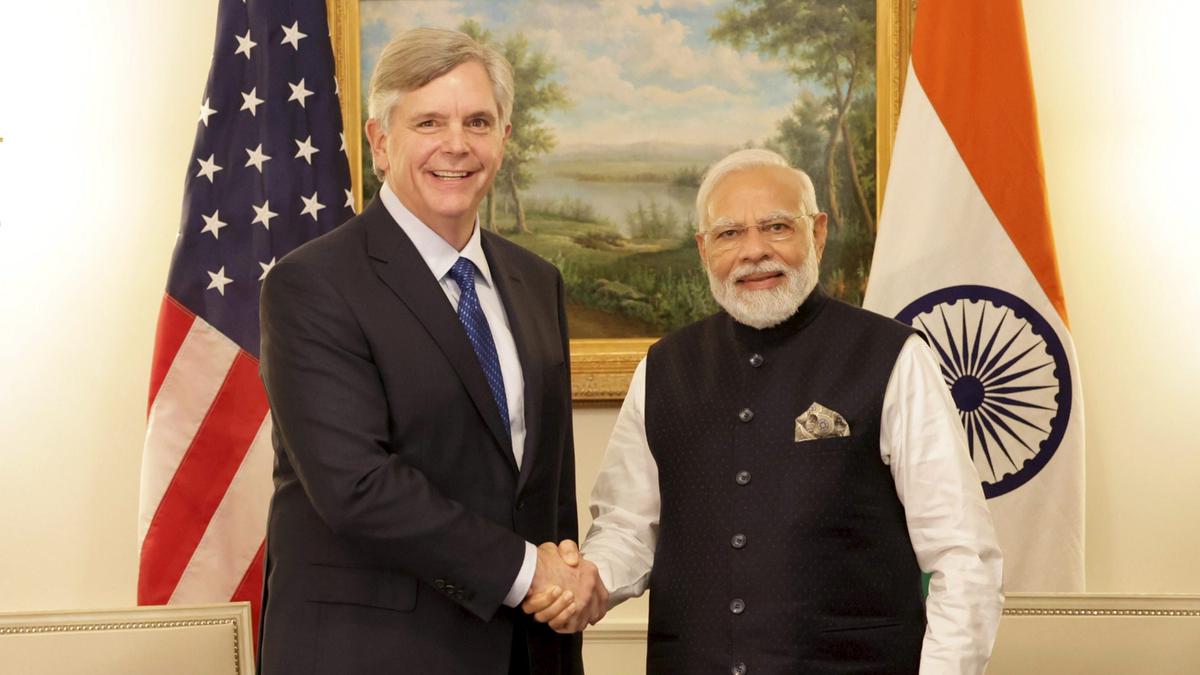
MoU between General Electric and Hindustan Aeronautics Limited — an opportunity for India to master jet engine technologies Premium
The Hindu
Memorandum of Understanding between General Electric and Hindustan Aeronautics Limited for the manufacture of GE F-414 jet engines in India, for the Hindustan Aeronautics Limited (HAL) Light Combat Aircraft (LCA) Mk 2 heralds a major high-technology cooperation between the oldest and largest democracies, which the U.S. has shared with very few of its closest allies.
Matching the hype and expectations in the run up to Prime Minister Narendra Modi’s visit to the United States, a joint statement from U.S. and India on June 22 announced that U.S. President Joe Biden and Prime Minister Narendra Modi hailed the landmark signing of a Memorandum of Understanding between General Electric and Hindustan Aeronautics Limited for the manufacture of GE F-414 jet engines in India, for the Hindustan Aeronautics Limited (HAL) Light Combat Aircraft (LCA) Mk 2.
This heralds a major high-technology cooperation between the oldest and largest democracies, which the U.S. has shared with very few of its closest allies. While the most critical technology of the engine will be off limits, details on what all technologies and industrial processes will be transferred to India is still awaited. “This trailblazing initiative to manufacture F-414 engines in India will enable greater transfer of U.S. jet engine technology than ever before. The leaders committed their governments to working collaboratively and expeditiously to support the advancement of this unprecedented co-production and technology transfer proposal,” the statement said.
The US has significant export controls and stringent licensing system for sharing sensitive and niche technologies. So, the deal is not fully done till the US Congress approves it, though with the bipartisan support for India at the Congress officials on both sides have expressed confidence that it would get through.
Jet engine technology is a proprietary of very few countries and is a closely guarded secret due to its extreme criticality in modern warfare. India made unsuccessful attempts in the past to develop an engine locally under the now shelved ‘Kaveri’ project. The Kaveri project was sanctioned by the Cabinet Committee on Security (CCS) in 1989 and over the course of 30 years before it was shut down entailed an expenditure of ₹2035.56 crore which saw the development of nine full prototype engines and four core engines.
While details on what specific technologies would be transferred to India are awaited, the deal is expected to give India access to several technologies and processes involved in the manufacture of jet engines. Indian industry both public and private, will get a chance to upgrade their capacities and skills as significant sourcing as well as manufacturing is expected to be done in the country. From a geopolitical lens, it does show the strategic bet that the US is placing on India to deepen its relationship.
Here in is an opportunity for India to master several related technologies with respect to jet engines and utilise that, in the medium term, to develop an engine entirely locally as certain technologies like the crystal blade technology will not be shared by anyone, no matter the price.
Earlier on Wednesday evening, Mr. Modi met H. Lawrence Culp, Jr., CEO of General Electric. “PM appreciated GE for its long-term commitment of manufacturing in India. PM and Mr. Culp, Jr. discussed GE’s greater technology collaboration to promote manufacturing in India,” the Press Information Bureau said in a statement adding, “PM invited GE to play greater role in aviation and renewable energy sector in India.”













